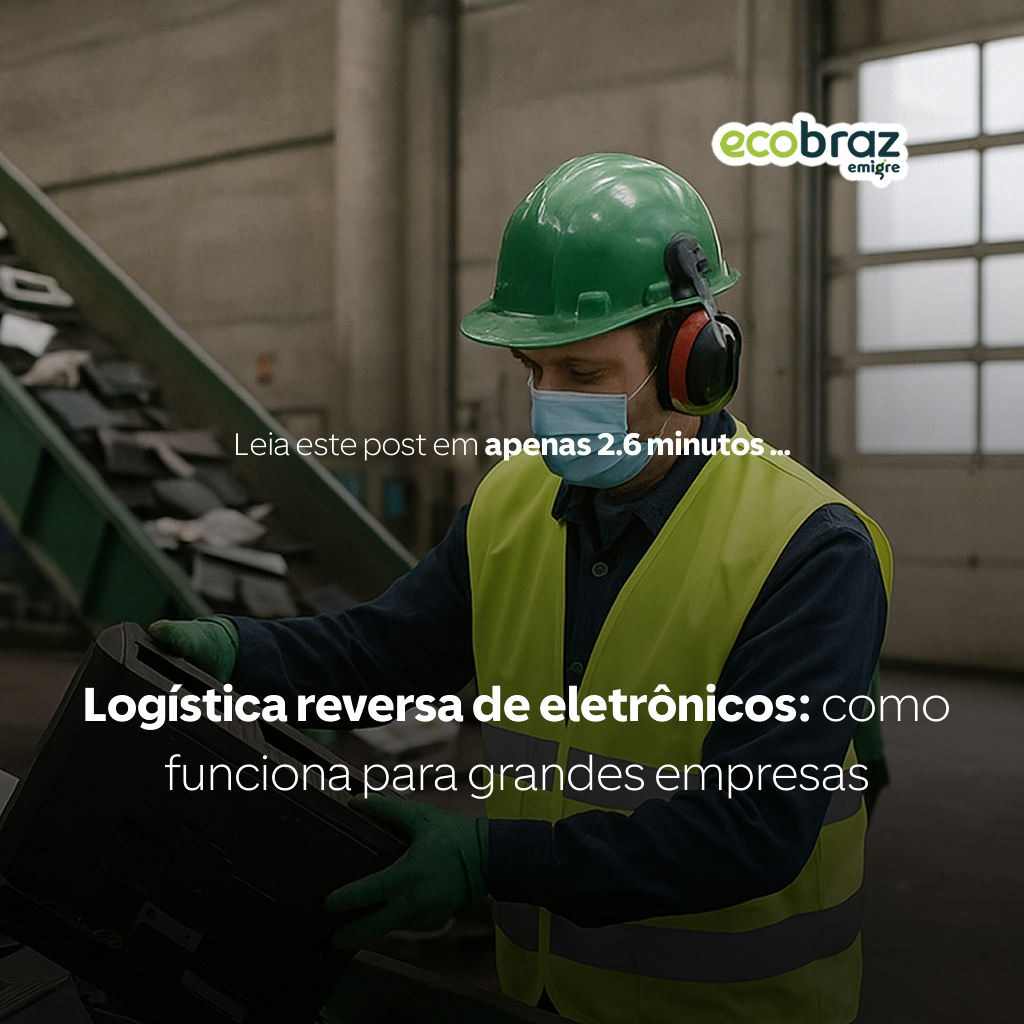Blog Ecobraz Eigre

Reverse Logistics of Electronics: How It Works for Large Companies
Introduction: The responsibility of large companies
Large corporations — such as industries, multinationals, marketplaces, and retail chains — handle massive volumes of electronic equipment. With that, they also assume proportional responsibility for the proper disposal of these items.
Monitors, CPUs, printers, laptops, cables, batteries, networking equipment, and even household appliances: all these products contain components that, if improperly discarded, pose environmental and public health risks.
This is why reverse logistics has gone from being a best practice to becoming both a regulatory requirement and a corporate strategy.
What is reverse logistics of electronics?
Reverse logistics is the process of returning products into the production cycle or proper disposal after use. For electronics, it involves:
-
Collection – picking up electronic equipment from generation points (companies, branches, warehouses).
-
Storage – keeping items in a safe location until transport.
-
Transportation – moving equipment to specialized recycling facilities.
-
Dismantling and sorting – separating usable, hazardous, and recyclable components.
-
Recycling and final destination – reusing metals, plastics, glass, and ensuring environmentally correct disposal of unusable residues.
This cycle ensures that no equipment ends up in common landfills or illegal destinations that put companies at risk of fines and lawsuits.
Key challenges for large companies
Implementing reverse logistics on a large scale is not simple. The main challenges include:
-
Volume of equipment → multinationals accumulate tons of waste in a short time.
-
Legal risk → Brazilian law (PNRS) requires formal documentation of disposal.
-
Operational cost → storage, transport, and recycling require infrastructure.
-
Technical complexity → each type of equipment has a different destination (batteries, boards, cables).
-
Multi-level management → companies with multiple branches need standardized processes across all units.
Ecobraz’s strategic role
Ecobraz Emigre acts as a strategic partner for large companies in fulfilling reverse logistics obligations. Its model stands out by offering:
-
Nationwide coverage → collection across all Brazilian territory.
-
Robust infrastructure → full facilities for receiving, storing, and recycling.
-
Complete documentation → manifests, invoices, technical reports, ESG documentation.
-
Security → safe disposal of sensitive equipment (such as ATMs and servers).
-
Scalability → support for large-scale operations, including multinationals and industries.
-
Social impact → proceeds are reinvested into digital inclusion projects in underserved communities.
Benefits for companies
Beyond legal compliance, reverse logistics with Ecobraz provides strategic benefits:
-
Regulatory compliance → eliminates risks of environmental fines.
-
ESG reputation → strengthens sustainability reporting and institutional image.
-
Operational efficiency → reduces costs and simplifies internal processes.
-
Stakeholder relations → demonstrates socio-environmental responsibility to clients, investors, and regulators.
-
Green marketing support → allows transparent communication about sustainability practices.
Practical applications
-
Technology multinationals → secure disposal of obsolete equipment at scale.
-
Retail chains → collection of products returned by customers.
-
Industrial companies → disposal of electronic machinery and production leftovers.
-
Financial institutions → safe disposal of ATMs and data equipment with secure destruction.
Conclusion: Sustainability with scale and credibility
For large companies, reverse logistics is not optional: it is both a legal requirement and a competitive strategy. However, implementing this process requires scale, credibility, and complete documentation.
👉 That’s why Ecobraz Emigre is the ideal partner: the world’s largest NGO in electronic waste recycling, combining technology, safety, social impact, and transparency.

Deixe um comentário
O seu endereço de e-mail não será publicado. Campos obrigatórios são marcados com *